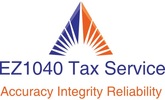
EZ1040 Tax Service was founded by Ron L. Frazier, who is an Enrolled Agent, Admitted to Practice Before the IRS
This professional designation (available since 1884) is awarded to individuals who have passed a rigorous examination administered by the Director of Practice of the Internal Revenue Service. Merely one-third of all who sit for the examination are able to pass. The credential is honored nationwide and allows Enrolled Agents to represent taxpayers in all matters of taxation, including Office and Field Audits, as well as Appeals and Collections.
Annual continuing education requirements, closely monitored by the U.S. Department of Treasury, ensure that Enrolled Agents maintain a superior level of knowledge and competency. Enrolled Agents specialize in the field of taxation and can prepare returns for individuals, partnerships, corporations, trusts, estate and other taxable entities. These professionals are authorized to appear on behalf and in place of taxpayers when called before the Internal Revenue Service.
An Enrolled Agent (E.A.) is a federally-licensed tax practitioner who has proven technical expertise in the field of taxation. Enrolled agents are empowered by the U.S. Department of the Treasury to represent taxpayers before all administrative levels of the Internal Revenue Service for audits, collections, and appeals.
What are the differences between Enrolled Agents and other tax professionals?
Only Enrolled Agents are required to demonstrate to the IRS their competence in matters of taxation before they may represent a taxpayer before the IRS. Unlike attorneys and CPAs, who may or may not choose to specialize in taxes, all Enrolled Agents specialize in taxation. Enrolled Agents are the only taxpayer representatives who receive their right to practice from the U.S. government (CPAs and attorneys are licensed by the states).
Are Enrolled Agents bound by any ethical standards?
Enrolled Agents are required to abide by the provisions of the Department of Treasury's Circular 230, which provides the regulations governing the practice of Enrolled Agents before the IRS.
This professional designation (available since 1884) is awarded to individuals who have passed a rigorous examination administered by the Director of Practice of the Internal Revenue Service. Merely one-third of all who sit for the examination are able to pass. The credential is honored nationwide and allows Enrolled Agents to represent taxpayers in all matters of taxation, including Office and Field Audits, as well as Appeals and Collections.
Annual continuing education requirements, closely monitored by the U.S. Department of Treasury, ensure that Enrolled Agents maintain a superior level of knowledge and competency. Enrolled Agents specialize in the field of taxation and can prepare returns for individuals, partnerships, corporations, trusts, estate and other taxable entities. These professionals are authorized to appear on behalf and in place of taxpayers when called before the Internal Revenue Service.
An Enrolled Agent (E.A.) is a federally-licensed tax practitioner who has proven technical expertise in the field of taxation. Enrolled agents are empowered by the U.S. Department of the Treasury to represent taxpayers before all administrative levels of the Internal Revenue Service for audits, collections, and appeals.
What are the differences between Enrolled Agents and other tax professionals?
Only Enrolled Agents are required to demonstrate to the IRS their competence in matters of taxation before they may represent a taxpayer before the IRS. Unlike attorneys and CPAs, who may or may not choose to specialize in taxes, all Enrolled Agents specialize in taxation. Enrolled Agents are the only taxpayer representatives who receive their right to practice from the U.S. government (CPAs and attorneys are licensed by the states).
Are Enrolled Agents bound by any ethical standards?
Enrolled Agents are required to abide by the provisions of the Department of Treasury's Circular 230, which provides the regulations governing the practice of Enrolled Agents before the IRS.

